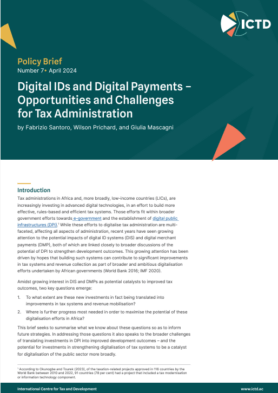Policy Brief 7
Tax administrations in Africa and, more broadly, low-income countries (LICs), are increasingly investing in advanced digital technologies, in an effort to build more effective, rules-based and efficient tax systems. Those efforts fit within broader government efforts towards e-government and the establishment of digital public infrastructures (DPI).
While these efforts to digitalise tax administration are multi faceted, affecting all aspects of administration, recent years have seen growing attention to the potential impacts of digital ID systems (DIS) and digital merchant payments (DMP), both of which are linked closely to broader discussions of the potential of DPI to strengthen development outcomes. This growing attention has been driven by hopes that building such systems can contribute to significant improvements in tax systems and revenue collection as part of broader and ambitious digitalisation efforts undertaken by African governments (World Bank 2016; IMF 2020).
Amidst growing interest in DIS and DMPs as potential catalysts to improved tax outcomes, two key questions emerge:
- To what extent are these new investments in fact being translated into improvements in tax systems and revenue mobilisation?
- Where is further progress most needed in order to maximise the potential of these digitalisation efforts in Africa?
This brief seeks to summarise what we know about these questions so as to inform future strategies. In addressing those questions it also speaks to the broader challenges of translating investments in DPI into improved development outcomes – and the potential for investments in strengthening digitalisation of tax systems to be a catalyst for digitalisation of the public sector more broadly.
